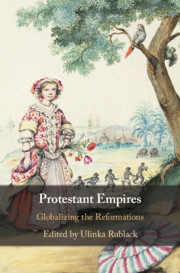Book contents
- Protestant Empires
- Protestant Empires
- Copyright page
- Contents
- Figures
- Contributors
- Introduction
- 1 Reworking Reformation in the Early English Atlantic
- 2 Puritanism in a Local Context: Ministry, People, and Church in 1630s Massachusetts
- 3 Learned Reading in the Atlantic Colonies: How Humanist Practices Crossed the Atlantic
- 4 Portable Lives: Reformed Artisans and Refined Materials in the Refugee Atlantic
- 5 Idolatry, Markets, and Confession: The Global Project of the de Bry Family
- 6 “Better the Turk than the Pope”: Calvinist Engagement with Islam in Southeast Asia
- 7 Inventing a Lutheran Ritual: Baptisms of Muslims and Africans in Early Modern Germany
- 8 Conversion and Its Discontents on the Southern Colonial Frontier: The Pietist Encounter with Non-Christians in Colonial Georgia
- 9 Globalizing the Protestant Reformation through Millenarian Practices
- 10 Global Protestant Missions and the Role of Emotions
- 11 The Sacred World of Mary Prince
- 12 New Perspectives on Gender and Sexuality in Global Protestantism, 1500–1800
- Index
4 - Portable Lives: Reformed Artisans and Refined Materials in the Refugee Atlantic
Published online by Cambridge University Press: 20 August 2020
- Protestant Empires
- Protestant Empires
- Copyright page
- Contents
- Figures
- Contributors
- Introduction
- 1 Reworking Reformation in the Early English Atlantic
- 2 Puritanism in a Local Context: Ministry, People, and Church in 1630s Massachusetts
- 3 Learned Reading in the Atlantic Colonies: How Humanist Practices Crossed the Atlantic
- 4 Portable Lives: Reformed Artisans and Refined Materials in the Refugee Atlantic
- 5 Idolatry, Markets, and Confession: The Global Project of the de Bry Family
- 6 “Better the Turk than the Pope”: Calvinist Engagement with Islam in Southeast Asia
- 7 Inventing a Lutheran Ritual: Baptisms of Muslims and Africans in Early Modern Germany
- 8 Conversion and Its Discontents on the Southern Colonial Frontier: The Pietist Encounter with Non-Christians in Colonial Georgia
- 9 Globalizing the Protestant Reformation through Millenarian Practices
- 10 Global Protestant Missions and the Role of Emotions
- 11 The Sacred World of Mary Prince
- 12 New Perspectives on Gender and Sexuality in Global Protestantism, 1500–1800
- Index
Summary
This contribution focuses on early modern refugee artisans, and their families, who engaged actively with print culture while cobbling together spiritual ideas, natural philosophies, local scientific knowledge, and dexterous craft skills during the earliest years of the industrial revolution. It provides a “deep” history of the little-known entrepreneur Jacques Fontaine (1658–1728), a Huguenot refugee. Together with his wife and sister-in-law, Fontaine invented a small fire machine to produce a cheap imitation-silk finish on a common woolen textile. Fontaine’s experiences working with this commodity embody the crucial strategy of the so-called New Luxuries. This beacme a mainstay of the vast majority of highly skilled refugee Huguenot artisans scattered throughout the Atlantic after the Revocation of the Edict of Nantes (1685), who elevated local materials of little intrinsic worth to successfully imitate more desirable, expensive, and polite imported goods of greater intrinsic value, while jumpstarting the early industrial and consumer revolutions.
Keywords
- Type
- Chapter
- Information
- Protestant EmpiresGlobalizing the Reformations, pp. 99 - 139Publisher: Cambridge University PressPrint publication year: 2020

